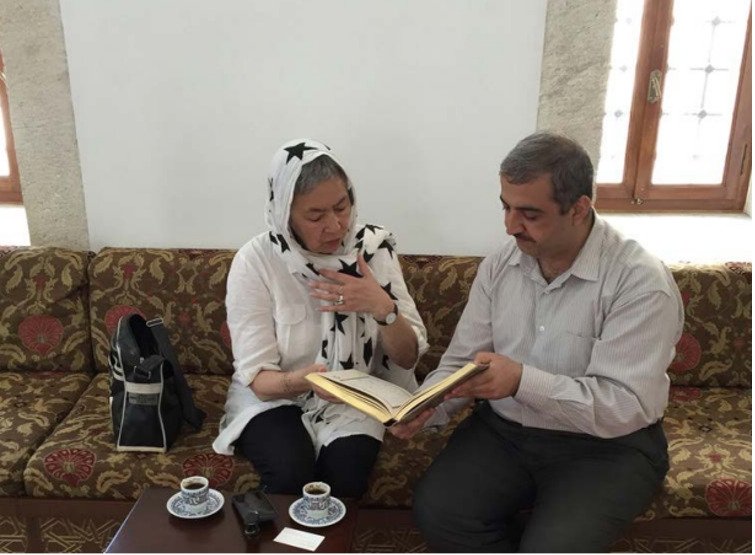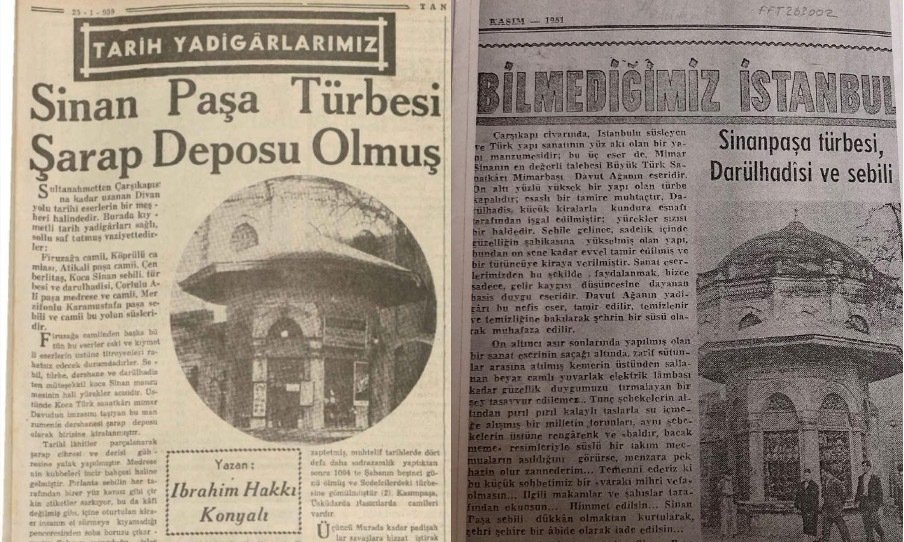© Turkuvaz Haberleşme ve Yayıncılık 2025
The Sinan Pasha Complex, situated in Istanbul’s historic peninsula, is a captivating sight on the left side as you descend toward Sultanahmet road from the Beyazıt-Kapalıçarşı tram stop. It holds a significant historical background and warmly welcomes all its visitors.
Those who come to visit the tomb of Sultan Murat III are warmly received by a diverse team of staff members representing various nationalities at the madrassa. These staff members provide informative guidance about the madrassa and the tombs and invite visitors to explore the courtyard.
Sinan Pasha, the individual after whom the complex was named, was a prominent statesman during the Ottoman Empire. He served as the grand vizier (prime minister) on five occasions and held esteemed titles such as Conqueror of Yemen and Tunisia. He also played a significant role in the empire’s conquests and was known for his contributions to the construction of various educational and public welfare institutions.
One of these notable establishments is the Sinan Pasha Madrassa, constructed by Davud Aga, a disciple of the renowned architect Mimar Sinan, as per the request of Sinan Pasha himself. Sinan Pasha was famous for his philanthropy and dedicated substantial funds to constructing and supporting madrassas, mosques, soup kitchens, caravanserais and bathhouses in Istanbul, the Arab peninsula and the Balkans.
The history of the madrassa is incredibly ancient, and it often surprises first-time visitors who initially anticipate only seeing the tombs. The staff members at the madrassa share that besides the tombs, they provide tafsir lessons, interpretation of religious texts and training to visitors. What’s more, they offer a diverse range of educational opportunities free of charge. Visitors are generally delighted and pleasantly surprised by the educational programs and resources at the Sinan Pasha Madrassa.

Eyüp Ahmet Tevke, the director of the Sinan Pasha Complex, spoke about the historical significance of the madrassa and the activities conducted today in an interview with Daily Sabah.
“The Sinan Pasha Complex is a historic site that has welcomed guests from 33 countries, and the number of countries continues to increase. Visitors to the complex describe it as a place to visit and a space where they can enrich themselves and engage in meaningful conversations. The staff at the madrassa make a conscious effort to explain and promote Islam to non-Muslim guests through their behavior and by cultivating a love for the religion. Hospitality is key, as guests are greeted with a smile, offered tea, and provided with treats,” Tevke said.
Tevke mentioned a unique visit by Mogens Lykketoft, the president of the United Nations General Assembly at the time, and his wife, journalist Mette Holm, during the World Humanitarian Summit in Istanbul in 2016. As part of a group tour exploring historical sites, they visited the madrassa and were deeply impressed by the hospitality and gifts they received.
“The Sinan Pasha Madrassa is open seven days a week and offers various activities for visitors. These include Quranic studies, Hadith classes, free calligraphy lessons, calligraphy exhibitions and seminars conducted in multiple languages such as Turkish, English, Arabic, Russian and Persian. In addition, the madrassa is seen as a center for propagation and invitation, to strengthen the bonds of brotherhood among Muslims from around the world while fostering unity and solidarity in the name of Islam,” he highlighted.

According to the law enacted on March 3, 1924, which placed all educational institutions in Türkiye under the authority of the Ministry of National Education, religious schools, including the Sinan Pasha Madrassa, were closed down and brought under a single umbrella. Tevke elaborated that a newspaper clipping from 1939 mentioned that the madrassa’s educational activities ended, and the building was subsequently used as a wine cellar and later as a hookah cafe until 2010. However, in 2010, it was allocated to a service foundation and underwent restoration. The madrassa resumed its educational activities in 2015.
The madrassa has a tradition of keeping visitor books and memoirs for years, where visitors leave their memories as a keepsake. These notebooks have recorded the emotions and memories of visitors from over 30 countries. According to the madrassa authorities, this is the second thick notebook filled with writing. The entries in the memory book are fascinating, and they include the feelings and thoughts of foreign nationals who have converted to Islam after visiting the madrassa. Many visitors believe their visit to the madrassa was not a coincidence but a result of divine guidance.
Visitors who spend hours at the madrassa, finding peace and enjoying tea and food, are increasingly drawn to the historical Sinan Pasha Complex. In addition to exploring the cemetery and sightseeing, visitors are captivated by the spiritual value added by the madrassa. With its historical appearance and warm hospitality, the madrassa is open to all visitors seven days a week on the Istanbul peninsula. The madrassa authorities aim to extend their hospitality to people from almost all countries.
